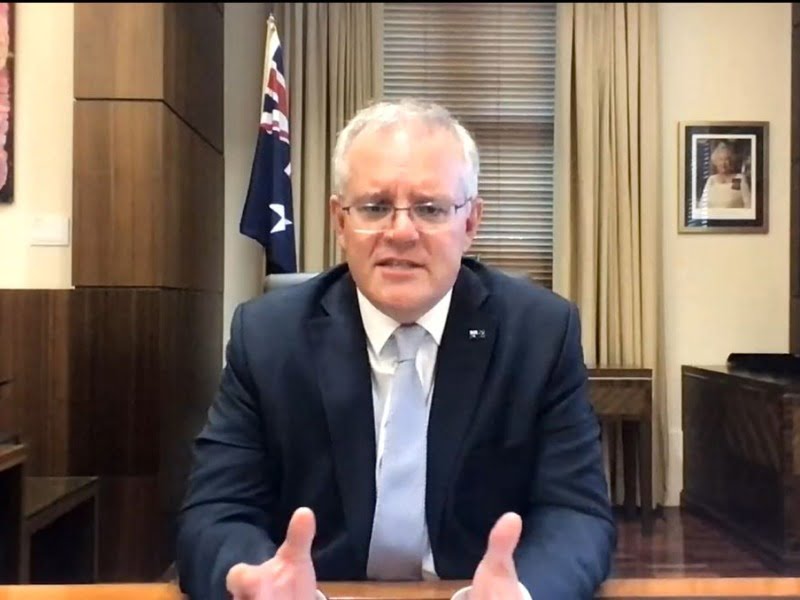The Prime Minister has applied a blow-torch to Big Tech at the G20 CEO Summit in Auckland, demanding the tech giants come up with industry codes of practice that meet heightened government expectations across a range of flash-point issues.
If the tech giants don’t come up with suitable codes to underpin regulations, the government certainly will, and the industry might not like the result, Scott Morrison warned during his oddly aggressive fireside chat with Microsoft president and vice-chair Brad Smith.
Whether it related to ‘anti-trust’ or anti-competition issues, consumer protections, the level of tax companies are paying, or issues of online content, the government would not tolerate a “Wild West” internet, Mr Morrison bluntly told Microsoft’s second most senior global executive.

If you didn’t already know there was a federal election looming, the well-prepared retail messaging of the Prime Minister’s targeted aggression would have offered a clue.
While there were “massive opportunities” that can be delivered through digital platforms and digital technologies, those digital platforms will not get a “free kick”, Mr Morrison said, name-checking Microsoft, Amazon, Facebook and Google.
The tech sector was “obviously an important source of income and wealth and jobs for our country, and we embrace it 100 per cent”, but it had developed and grew well ahead of regulatory settings.
“The rules that apply in the real world should apply in the digital world,” Mr Morrison said.
“So, whether that’s antitrust or whether that’s consumer protection, whether it’s paying tax, whether it’s respecting content and all of those sorts of issues … we can’t treat the digital world like it’s the Wild West and it’s a lawless space and you can’t have business models, which depend on it being that either,” he said.
“It’s important that those who are creating this digital world are part of that process [of modernising regulation] because if you just leave it to governments to do it, well, they’ll stuff it up. Because they don’t understand it the same way.
“There’s always been a lot of benefit in a regulatory partnership which sees these rules that are put in place which get the best out of digital platforms, but also don’t let those digital platforms operate with a free kick.”
Mr Morrison said whether it’s the Online Safety Act on issues of content, the controversial media bargaining code, or making sure that companies paid tax, they were straight-forward issues of regulation – rather than ideological – that needed to be resolved.
“They’re better resolved in partnership because if they’re not, governments will just do it anyway. And when we will do it, we won’t do it as well as I think we possibly can,” he said.
The “regulatory partnership” model described by Mr Morrison does raise issues around transparency and process. The Online Safety Act passed last June and comes into effect in January next year. But the position paper that directs the creation of industry codes was only published in September.
The industry codes are underpinned by the legislation, but the design of these codes of practice all happens behind closed doors – rather by legislators in the full view of the public.
Regardless, the Prime Minister was pushing more stringent digital regulation in stark terms – certainly pressing the argument harder than this government ever has.
Just as the uptake of digital technology had accelerated across the economy, the presence of online criminals had also accelerated.
“The crooks are just as good as applying technology as anyone else. And we’ve seen that in this country, we’ve seen it all in all countries.
“And that’s why our regulatory systems and our protection systems really have to kick in and go to a whole other level. And that’s where I do really appeal to the digital platforms in the sector themselves.”
The Prime Minister said online platforms cannot continue to offer anonymity, which he said erodes fundamental principles underlying free speech.
“We need to now make sure that [platforms are] not being used as a tool for people to harass people, to exploit people, to intimidate people. We’re seeing this more and more the impact on the mental health of our young people, through cyber bullying and cyber abuse. And there are two key issues here,” Mr Morrison said.
“The first one is to recognise that, you know, digital platforms are publishers. And the second one is free speech only works in a free society where there isn’t anonymity. Free speech isn’t about to say whatever you want and not be accountable for it.
“That’s the whole point of free speech. Say whatever you like in our country, but you’re accountable for what you say.
“We can’t have digital platforms providing a shield for people to engage in online abuse, because if we allow that to happen, digital platforms will not be a safe space for consumers, for our children [and] we won’t get the right outcomes on education and skills development and the broader, you know, commercial opportunities that are there.”
Do you know more? Contact James Riley via Email.

